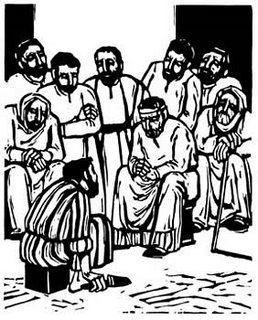Burial and the Hereafter in Yahwism, Part 5
Among the Ndali people of southwest Tanzania, each kin-group has its own special cemetery plot (masheto) for burying its dead. Burial in the traditional family-grounds symbolizes and ensures that the deceased will join the fellowship of the ancestors in the hereafter. Such a link between burial on traditional, ancestral land on the one hand and ongoing communion with kin in the hereafter on the other hand is standard in African traditional religions.

This African comparative model greatly illuminates the traditional Yahwistic view, where inherited, ancestral land symbolizes and insures kinship ties and bonds of community and mutuality. Burial physically with the lineage on kin land is an act of khesed toward the dead (Gen 49:29-30; 50:25).
Consider, for example, the book of Ruth. Ruth and Naomi go to great efforts to show loyalty to dead Mahlon and dead Elimelek by keeping them associated with kin-owned inherited land, "raising up the name of the deceased on his inheritance" (Ruth 4:5). They are desperate to keep their dead linked to the branching, verdant tree of shared descent planted on ancestral grounds.
For Ruth and Naomi, it is not just a matter of the dead living on in memory and reputation. The emphasis on the tie to ancestral land (Ruth 4:5) is all about buttressing and solidifying the land-based communion of all members, living and dead, within the great, living family-tree of descent. Preserving the binding ties of this communion is khesed on behalf of the living-dead (Ruth 2:20).
Why is Ruth's closest relative so worried about jeopardizing his "own patrimony" (Ruth 4:6)? Why does he put it this way, instead of articulating worries  about, say, his ongoing reputation or the welfare of his children? His focus on his relationship to his "own patrimony" is a self-oriented concern for his welfare after death. Only after his death would his patrimony be divided up and put in jeopardy. Only after his death might his soul be catapulted like a sling-stone away from land-based communion with his kin. It is his patrimony on which he centers his focus because it is his personal security and asylum in the hereafter that he is worried about (cf. Gen 49:29-30). He is a selfish man, afterall. He wants his own name raised up on his own ancestral inherited land. The operative equation is land-burial + kinship-bonding + personal-afterlife, elements linked throughout Ruth (cf. Ruth 1:16-17 nrsv).
about, say, his ongoing reputation or the welfare of his children? His focus on his relationship to his "own patrimony" is a self-oriented concern for his welfare after death. Only after his death would his patrimony be divided up and put in jeopardy. Only after his death might his soul be catapulted like a sling-stone away from land-based communion with his kin. It is his patrimony on which he centers his focus because it is his personal security and asylum in the hereafter that he is worried about (cf. Gen 49:29-30). He is a selfish man, afterall. He wants his own name raised up on his own ancestral inherited land. The operative equation is land-burial + kinship-bonding + personal-afterlife, elements linked throughout Ruth (cf. Ruth 1:16-17 nrsv).
0 Comments:
Post a Comment
<< Home